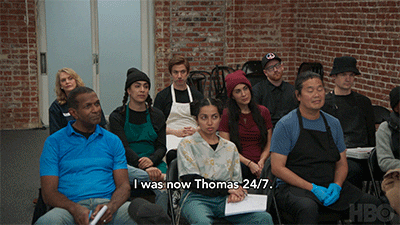Applying a Saner Version of the Absurd Fielder Method to Writing ✍️🎬
What this bizarre approach from ‘The Rehearsal’ teaches about getting inside your characters' heads 🧠 (Spoilers Ahead!)
Last week, I watched one of the most bizarre shows ever called 'The Rehearsal'.
The initial premise seems to be that Nathan Fielder, the creator and star of the show, would help ordinary people rehearse for difficult conversations or life decisions by creating elaborate, hyper-realistic replicas of the actual situations they’d face.
But then it got weird when Nathan himself started practicing being a father with Angela, a woman who wanted to experience what parenting would be like before committing to having kids.
What starts as him helping her quickly becomes Nathan living through an accelerated timeline of fatherhood—with child actors playing his "son" at different ages.
Things got even weirder when he sets up an acting school to teach what he called the “Fielder Method.” It is an absurdly elaborate approach where actors don't just study their subject or “primary” (as Nathan calls them), they essentially live their lives.
We're talking moving into replica apartments, working their actual jobs, following their daily routines for weeks until the behavior becomes automatic.
It's method acting cranked up to a ridiculous, almost unhinged degree.
Beyond Comedy
Now, watching this unfold, my first instinct was to dismiss it as peak absurdist comedy. And it is that—Fielder pushes everything to satirical extremes.
But there's something here that made me think about writing.
You know that moment when you're developing a character and you get stuck thinking “What would this person actually do?” and find yourself wishing, “What if I could just slip inside their head, walk through their world, and absorb everything there is to know about how they think and move through life?”
But we can't. We just sit back in our chairs, maybe close our eyes, and try to imagine our way into their reality.
A Middle Ground?
Obviously, I'm not suggesting you start stalking people or moving into replica apartments (please don't).
But there must be something between Nathan's extreme method and our usual approach of just sitting and imagining. What if there are ways to get closer to our characters' reality without going full Fielder?
Instead of just thinking about what your character would do, what if you occasionally put yourself in situations that mirror theirs?
If you're writing about a night-shift worker, try staying up all night and notice how the world feels different—the eerie quiet of empty streets, how your body fights against its natural rhythm, the strange camaraderie with other night people like security guards and taxi drivers.
You'll understand why your character might feel disconnected from the daytime world in ways you never imagined just sitting at your desk.
Writing about someone who takes the bus to work every day? Ride public transport for a week and pay attention to the rhythms, the interactions, the small frustrations.
Your character works in a call center? Spend time in a loud, open office environment making continuous phone calls—notice how your voice gets hoarse, how you develop scripts for difficult conversations, and how constant rejection starts wearing you down.
You don't need to live your character's entire life. But sometimes stepping into their world, even briefly, reveals truths that imagination alone never could.




